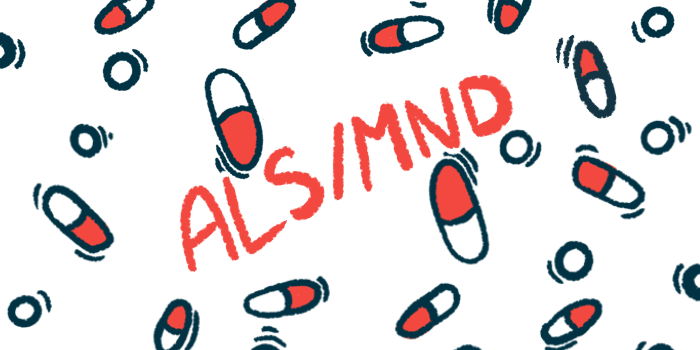ALS/MND 2023: Gout med fails to show efficacy in small trial
Colchicine did not significantly slow ALS progression, Phase 2 results show
Written by |

Colchicine, an anti-inflammatory medication used to treat gout, was safe, but did not significantly slow the progression of amyotrophic lateral sclerosis (ALS) in a small Phase 2 clinical trial.
While some clinical measures suggested a possible benefit of a low dose of colchicine in slowing disease progression and extending survival, most efficacy and biomarker outcomes failed to reach statistical significance. Researchers believe more clinical trials will be needed to establish the possible efficacy of the medication in ALS and to understand responses to different doses of colchicine.
“The absence of statistically significant results in most outcome measures … does not indicate a clinical efficacy of colchicine in this context,” Jessica Mandrioli, MD, of the University of Modena and Reggio Emilia in Italy, said in an oral presentation at the 34th International Symposium on ALS/MND, being held Dec. 6-8 in Basel, Switzerland, and virtually.
“In this moment, we have to deepen the knowledge of this drug before going on,” Mandrioli added.
The presentation was titled “Safety profile, biological and clinical effects of colchicine in ALS: results from a phase 2 multicenter, randomized, controlled, double-blind clinical trial.” (C61 in the symposium abstract book.)
In nearly all cases of ALS, a misfolded version of the TDP-43 protein toxically accumulates in nerve cells, driving cell damage and death. That’s why therapeutic strategies to target this abnormal protein — including ones that would enable its proper folding or clear it altogether — are of interest for treating ALS.
Colchicine is an approved medication — sold in the U.S. under distinct brand names and generics —used to prevent and treat gout attacks, to treat a rare condition known as familial Mediterranean fever, and to lower the risk of cardiovascular conditions. It works to ease inflammation and reduce the buildup of uric acid in the joints, which causes the painful symptoms of gout.
Among its effects, colchicine induces the activity of certain proteins involved in autophagy, a cellular process by which old, damaged, or faulty proteins are engulfed and recycled. Some evidence suggests that a failure of the autophagy process could contribute to the accumulation of misfolded proteins in ALS and related conditions.
Previously, the scientists found that colchicine boosted the activity of HSPB8, an autophagy protein that’s been shown to promote the removal of misfolded proteins implicated in ALS.
As such, the researchers are exploring it as a possible therapeutic option for enhancing autophagy-mediated clearance of TDP-43. The scientists also believe the medication’s anti-inflammatory effects could be of benefit in ALS.
Reasons for choosing colchicine
“We chose to study colchicine in ALS because colchicine is an inexpensive drug and immediately available and it has two mechanisms of action that can be useful for ALS,” Mandrioli said.
The Phase 2 Co-ALS clinical trial (NCT03693781) was designed to evaluate the effects of oral colchicine treatment in ALS patients.
A total of 54 participants, ages 18-80, were enrolled across several sites in Italy and assigned randomly to receive colchicine at a dose of 0.01 or 0.005 mg/kg, or a placebo. Treatment was taken orally once a day for 30 weeks (about seven months), and patients were followed for up to week 54, or about one year. All could continue to receive a stable dose of riluzole (i.e., Rilutek, Tiglutek) throughout the trial.
Evaluating ALS progression was main goal of trial
The trial’s main goal was to evaluate changes in disability progression, as assessed by the ALS Functional Rating Scale-Revised (ALSFRS-R), where a lower score indicates greater disability. Specifically, researchers were looking for the proportion of patients who achieved a positive treatment response, or no more than a 4-point decline in ALSFRS-R scores after 30 weeks.
Among patients treated with colchicine at its 0.005 mg/kg dose, about a third (33.3%) achieved this endpoint, compared compared with 13.3% who achieved that in the placebo group. This indicated a slower disability progression with this colchicine dose, but the difference did not reach statistical significance. Among those given colchicine at its higher dose, 7.1% achieved a positive response.
While positive responses were not significantly more frequent with either colchicine dose, monthly ALSFRS-R scores declined significantly slower for those receiving low dose colchicine than those on a placebo, and this significant difference was maintained throughout the post-treatment follow-up.
A trend toward prolonged survival and preserved respiratory function for patients on the lower dose also was observed, although not statistically significant. Secondary outcomes related to biomarkers of neurodegeneration, inflammation, or autophagy, were generally not different between groups.
Blood levels of a toxic version of TDP-43 increased in the placebo group, and generally decreased with colchicine, with a significant difference observed between the placebo and the combined colchicine groups at 30 weeks.
Interpret results cautiously, researcher says
“I would like to underline that the numbers are very, very small, so we have to be very cautious in interpretation,” Mandrioli noted.
Rates of side effects were similar between groups. Gastrointestinal side effects were more common in patients receiving colchicine, consistent with its known safety profile.
“Colchicine treatment was safe, but further trials are necessary to evaluate efficacy of this commercial drug in ALS,” the researchers concluded in the presentation’s abstract.






